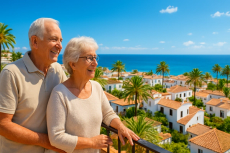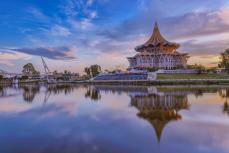Blog • Published on:July 30, 2025 | Updated on:September 18, 2025 • 18 Min
A Complete Guide to Retiring in Canada
Retiring abroad is more than just a change of scenery; it's a lifestyle transformation. For many retirees around the world, Canada stands out as a top destination thanks to its world-class healthcare, political stability, breathtaking landscapes, and welcoming immigration policies.
While there’s no official “retirement visa,” there are multiple pathways that make retiring in Canada not just possible, but practical.
From joining family through sponsorship to investing in a new life or tapping into provincial immigration programs, there are options designed for a wide range of retirees, whether you’re moving closer to loved ones or simply seeking a new beginning.
This guide walks through everything you need to know to retire in Canada comfortably and confidently.
Benefits of Retiring in Canada
Exceptional Quality of Life
Canada ranks among the top 10 countries globally for quality of life, with consistently high scores in safety, healthcare, and environmental quality. According to the Global Peace Index, Canada is the 14th safest country in the world.
Cities like Victoria, Ottawa, and Québec City regularly top national “best places to live” lists for seniors, offering walkable communities, green spaces, and access to cultural amenities.
Universal Healthcare System
Canada’s Medicare system ensures that permanent residents have access to free public healthcare, covering doctor visits, hospital stays, and medically necessary procedures.
Healthcare is administered at the provincial level, so the specific coverage and wait times vary by location, but all citizens and permanent residents are entitled to coverage.
While new residents may have to wait up to three months for provincial healthcare to kick in, private insurance can bridge that gap affordably.
Prescription medications, dental care, and vision are not fully covered under Medicare, but supplemental insurance is widely available.
Safe, Stable, and Welcoming
Canada is known for its political stability and social trust, two key ingredients for a stress-free retirement. Crime rates are low, and social services are strong.
The country actively supports immigrant integration, with multilingual services, community centres and a population where over 20% are foreign-born, making cultural adaptation smoother.
Natural Beauty & Outdoor Lifestyle
Retirees in Canada enjoy access to an expansive natural playground: 37 national parks, 11 national park reserves, over 2 million lakes (more than any other country), and miles or protected coastline and forest trails.
Outdoor activities like kayaking, birdwatching, hiking, golfing, and cross-country skiing are all part of everyday life.
Living near nature isn’t just scenic, it’s healthy. Studies show that Canadians aged 65+ living in walkable, green neighbourhoods report higher satisfaction and lower rates of depression and chronic illness.
A Growing Retiree Population
Canada’s senior population is rising steadily. In 2025, retirees (65+) make up around 18% of the national population, amounting to over 7.5 million people.
Government planning is increasingly focused on supporting aging citizens, from improved healthcare infrastructure to senior tax credits and housing support programs.
Canadian Retirement Immigration Programs
There is no dedicated “retirement visa” in Canada, but retirees can still move through several legal immigration routes.
These programs are designed to reunite families, attract investors, or meet provincial needs, and many of them are used by retirees every year.
Parent and Grandparent Super Visa
The Super Visa is a long-term, multiple-entry visa for parents or grandparents of Canadian citizens or permanent residents.
- Allows stays of up to 5 years at a time, renewable without reapplying
- Valid for 10 years, letting retirees visit Canada without frequent re-entries
- Requires proof of private medical insurance to the value of C$100,000 valid for at least one year
- The sponsoring child or grandchild must meet minimum income thresholds to support the retiree
This is ideal for retirees who want extended visits without giving up their primary residence or waiting for permanent residency.
Family Sponsorship Program
Permanent residency is possible through the Parents and Grandparents Program (PGP).
- Canadian citizens and permanent residents can sponsor their parents/grandparents for PR status
- Requires the sponsor to meet minimum income requirements for three consecutive years
- Sponsored individuals receive full access to healthcare and social services once approved
- The application intake opens once per year, through a lottery-based selection
Note: Due to high demand, spots are limited and allocated by random draw, making it competitive.
Investment-Based Immigration Options
For financially independent retirees, investment immigration is one of the most flexible paths:
- The Start-up Visa Program allows entrepreneurs to gain permanent residence if they start a business supported by a Canadian venture fund or incubator.
- Retirees can qualify if they launch a business or co-found one with younger partners, even if they don’t intend to work full-time.
- Some provinces have entrepreneur immigration streams requiring:
- A minimum net worth (often C$600,000+)
- A business investment (typically C$200,000+)
- Commitment to actively manage the business for a period
While not designed for traditional retirement, these programs are popular with wealthy retirees seeking permanent residency through business ownership.
Financial Requirements for Retiring in Canada
If You’re Applying for Permanent Residency (Express Entry or PNP)
You must show that you have enough money to support yourself (and your family) when you settle in Canada.
Here’s how much you need in 2025:
You must have this money in your own bank account (or joint with a spouse). It must be readily available, not tied up in property or business.
If You’re Being Sponsored by Family (Parent/Grandparent Sponsorship or Super Visa)
Your child or grandchild in Canada must meet a minimum income level in 2024 to sponsor you in 2025.
Here’s what they need to earn:
This applies to both the Parent/Grandparent Program (PGP) and the Super Visa.
Healthcare Insurance Requirements (Super Visa Only)
A Super Visa applicant must have Canadian private medical insurance:
- Coverage must be purchased prior to arrival,
- Valid for at least one year, and
- Provide a minimum coverage of C$100,000 per entry
Cost of Living for Retirees in Canada
Housing & Rental Costs
- One-bedroom apartments in major cities (Toronto, Vancouver): around C$2,400/month; two-bedroom units can reach C$ 3,300/month.
- Mid-size cities like Montreal and Calgary: C$1,650–1,900/month for a one-bedroom.
- Small towns/rural areas (e.g., Saskatchewan, New Brunswick): one-bedroom rents average C$1,000–1,400/month.
Daily Living Essentials
- Groceries for one person: typically, C$300–400/month; more in big cities like Toronto or Vancouver.
- Utilities (electricity, water, heat): about C$120–200/month, varying by season.
- Internet & cell phone: generally, C$70–100/month for internet, and C$ 60–100/month for mobile plans.
Getting Around
- Public transit passes in major cities range from C$150–160/month.
- Driving costs include fuel (C$ 1.60–1.90 per litre), insurance (can be high in BC and Ontario), and ongoing maintenance/parking.
Seniors & Assisted Living
- Independent living in senior residences typically costs C$1,800–3,500/month.
- Assisted living facilities (with added care services) cost about C$3,000–6,000/month on average.
- Long‑term care (24/7 supervision) can exceed C$6,000/month, depending on location and level of care.
Best Places to Retire in Canada
Canada’s vast geography offers a wide range of lifestyles, from coastal relaxation to cosmopolitan city living.
Here are five standout cities for retirees in 2025, each offering unique advantages depending on your preferences, budget, and healthcare needs.
Victoria, British Columbia
- Why retirees love it: Victoria has the mildest climate in Canada, making it ideal for year-round outdoor living without harsh winters.
- Lifestyle: A laid-back, coastal vibe with access to beaches, gardens, and walking trails. There’s a strong retiree presence here, with plenty of community support.
- Healthcare access: Excellent. Victoria General Hospital and Royal Jubilee Hospital are among the most respected in BC.
- Cost: Higher end. Expect to pay around C $2,200+ in monthly rent for a one-bedroom in the city.
Vancouver, British Columbia
- Why retirees love it: A world-class city with ocean views, mountain access, diverse cuisine, and strong public services.
- Lifestyle: Combines urban sophistication with nature. Great for active retirees who love hiking, biking, or sailing.
- Healthcare access: Strong network of hospitals and specialists. UBC Hospital and Vancouver General Hospital are among the top-rated.
- Cost: One of the most expensive cities in Canada. Rent for a one-bedroom apartment averages CAD $2,400–$2,700+.
Toronto, Ontario
- Why retirees love it: Canada’s largest city is packed with entertainment, cultural events, top hospitals, and amenities tailored to senior living.
- Lifestyle: Fast-paced but full of opportunity. Multilingual communities, walkable neighbourhoods, and excellent public transit make it manageable even for older residents.
- Healthcare access: Outstanding, with top-tier hospitals like Toronto General and Mount Sinai.
- Cost: Expensive. Rent for a one-bedroom runs C$2,300–$2,600/month.
Halifax, Nova Scotia
- Why retirees love it: A slower pace of life on the Atlantic coast, with historic appeal and growing healthcare infrastructure.
- Lifestyle: Friendly small city feels with access to beaches, seafood markets, and scenic drives. A great place to stay connected to nature and community.
- Healthcare access: Good for a smaller city. QEII Health Sciences Centre is the largest teaching hospital in Atlantic Canada.
- Cost: More affordable than big cities. Rent for a one-bedroom averages C$1,400–$1,700/month.
Québec City, Québec
- Why retirees love it: Cobblestone streets, French-inspired cuisine, and a rich history give this city a unique old-world charm.
- Lifestyle: Peaceful, artistic, and scenic. Great for retirees seeking culture, museums, and walkable architecture.
- Healthcare access: Solid regional healthcare network, though services are primarily in French.
- Cost: Moderate. Rent for a one-bedroom is around C $1,100–$1,400/month.
Canadian Healthcare System for Retirees
Canada’s healthcare system is robust and widely regarded, but newcomers need to understand how it works, and where gaps may arise, especially during the first few months.
Provincial Health Insurance Plans (Public Coverage)
Canada’s universal healthcare is delivered by each province or territory. As a new permanent resident, you must register for your province’s plan before coverage begins.
- 90‑Day Waiting Period:
In Ontario, British Columbia, Québec, Saskatchewan and the three territories (Yukon, Northwest Territories, Nunavut), you’ll face a three‑month delay from your date of arrival before public coverage starts. During this gap, private insurance is strongly advised.
- Immediate or Minimal Delay:
In Alberta, Manitoba, Nova Scotia, New Brunswick, Prince Edward Island and Newfoundland & Labrador, coverage is effective right away once you register (or begins within a few days), so you won’t need private health insurance for a waiting period.
What the Waiting Period Means
New permanent residents who are subject to provincial waiting periods should:
- Apply for provincial health coverage as soon as you arrive.
- During the waiting period, consider private health insurance to avoid out-of-pocket costs for emergencies.
Private Health Insurance Options
Having private coverage is especially important for:
- New PRs in provinces with waiting periods
- Super Visa holders, who must have insurance valid for at least one year, with minimum coverage of C $100,000
Estimated monthly costs in 2025:
- Local private health plans: C $100–$200/month
- International/expat plans (e.g., for Super Visa or long stays): C $200–$300/month
Limits of Public Coverage
Public insurance covers essential medical services, doctors, hospitals, surgeries, but typically does not include:
- Prescription medications (except in Québec)
- Dental care, vision, chiropractic, physiotherapy
- Private hospital rooms or elective treatments
Many retirees safeguard against these gaps through supplemental insurance or employer/union benefits.
Long-Term & Assisted Living Care
Here’s what seniors might expect for senior-living options in 2025:
- Independent living communities: C $1,800–$3,500/month
- Assisted living facilities: C $3,000–$6,000/month
- Full long-term care (24/7 nursing): typically, C $6,000+ month, depending on location and care level
For example, British Columbia subsidies may set a minimum rate of C $1,857/month per couple for publicly assisted options, depending on income and location.
Legal Requirements & Documentation for Retiring in Canada
Whether you're planning to settle permanently or stay for extended periods as a visitor, retiring in Canada requires a clear understanding of the legal and administrative steps. Below are the core documents and processes you’ll need to complete as part of your move.
Immigration Documentation
Canada doesn’t offer a dedicated “retirement visa,” so retirees enter the country under other immigration streams like family sponsorship, investment, or long-term visit visas. Regardless of the path:
- Permanent Residents (PRs) receive a Confirmation of Permanent Residence (COPR) and a PR card once they arrive.
- Super Visa holders must provide:
- Proof of private Canadian health insurance
- Letter of financial support from a child/grandchild in Canada
- Medical exam results (if requested)
- All visitors or PR applicants must carry a valid passport and may require a Temporary Resident Visa (TRV) depending on their nationality.
Social Insurance Number (SIN)
Once you become a PR, you’ll need to apply for a Social Insurance Number to access government services, pay taxes, and potentially receive public pension or benefits.
- You can apply online or in person through Service Canada.
- It’s free, and you’ll need your PR card or COPR, along with your passport.
Provincial ID or Driver’s Licence
As a resident, you’re expected to have official identification issued by your province or territory.
- If you plan to drive, you can exchange your foreign driver’s licence for a provincial one in most provinces (restrictions and testing may apply).
- If not driving, you can apply for a non-driver photo ID card, useful for banking, healthcare access, and travel within Canada.
Each province has its own application process:
- Ontario: ServiceOntario
- BC: ICBC
- Québec: SAAQ
Healthcare Registration
Once eligible, you must apply for provincial healthcare:
- Register through your province’s health department.
- Required documents usually include your PR card or COPR, passport, and proof of residence.
- Waiting periods apply in some provinces.
Housing Options for Retirees in Canada
Finding the right home is a major part of your retirement journey. Canada offers a wide range of housing choices for retirees, whether you’re looking to own, rent, or live in a supportive community setting.
Your ideal option will depend on your lifestyle, health needs, and budget.
Buying Property in Canada
There are no residency restrictions preventing foreigners or non-citizens from buying property in Canada (except for temporary foreign buyer bans in some urban areas, which do not apply to permanent residents or citizens).
- PR holders and sponsored retirees can purchase real estate just like Canadian citizens.
- You’ll need a Canadian bank account, a lawyer/notary, and a mortgage pre-approval if financing your purchase.
- Expect to pay property transfer taxes, legal fees, and possibly a foreign buyers' tax in some provinces.
Typical home prices in 2025:
- Vancouver: Over C$1.3 million
- Toronto: Around C$1.1 million
- Halifax & Quebec City: Between C$400,000–$600,000
Retirement Communities
These are independent living communities designed for seniors, offering privacy, safety, and access to amenities such as social events, fitness classes, and 24/7 support staff.
- Great for active retirees looking for community living without intensive care.
- Some communities are age-restricted (55+), while others welcome any adult.
- Monthly fees usually range from C$1,800 to C$3,500, depending on location, services, and suite size.
Pros:
- Maintenance-free living
- Built-in community and support
- Optional meal and housekeeping services
Assisted Living Facilities
For retirees who need support with daily activities like medication, bathing, or meal prep, assisted living provides a middle ground between independence and full-time care.
- Includes help from trained staff while still offering private rooms or apartments.
- Monthly costs range from C$3,000 to C$6,000, depending on services and province.
- Available through both public (subsidized) and private providers.
Wait times can apply for subsidized spots, so it’s best to plan early.
Financial Planning for Canadian Retirement
Whether you're settling in a city condo or a seaside village, long-term financial planning is key to a secure retirement in Canada.
Beyond basic proof of funds, you’ll need to set up your banking, understand pension transfers, explore investments, and ensure your estate is in order.
Banking Setup
Setting up a Canadian bank account is one of the first steps toward financial stability after arrival.
- You don’t need to be a citizen to open an account. Most major banks (RBC, TD, Scotiabank, BMO, CIBC) allow non-residents or new PRs to open personal accounts with a passport and immigration documents.
- It’s best to open an account as soon as you arrive, especially if you’re planning to rent or buy property.
- Some banks also offer senior-friendly accounts with no monthly fees and perks like free cheques or discounted investment advice.
Tip: For smoother pension or fund transfers, choose a bank that supports international wire transfers and multi-currency accounts.
Investment Opportunities
Retirees with PR status can invest in a wide range of vehicles, including:
- Tax-Free Savings Accounts (TFSAs): Grow your savings without paying tax on interest, dividends, or capital gains. Annual contribution limit in 2025 is C$7,000.
- Guaranteed Investment Certificates (GICs): Safe, fixed-return investments ideal for conservative income planning.
- Mutual funds and Exchange Traded Funds (ETFs): Available through Canadian brokers for diversified exposure.
- Real estate: A common retirement investment, but factor in taxes, maintenance, and market volatility.
Important: Non-residents face stricter rules and withholding taxes on investment income. Permanent residents have full access to tax-advantaged products like TFSAs and Registered Retirement Savings Plans (RRSPs).
Pension Transfer Options
You can receive foreign pensions while living in Canada, but it depends on the tax and benefits agreement between Canada and your home country.
- The U.S.–Canada Totalization Agreement allows American retirees to receive Social Security while living in Canada.
- Similar agreements exist with the UK, EU countries, Australia, and others, enabling the transfer or coordination of pension payments.
- Some private pensions (401(k), IRAs, UK SIPPs) may be taxed by both countries, unless a tax treaty prevents double taxation.
You’ll likely need help from a cross-border financial advisor to manage these correctly.
Estate Planning
If you plan to stay in Canada long-term, your estate plans must align with Canadian law:
- Wills must follow provincial laws, a will made abroad may not be valid.
- Canada does not have inheritance tax, but your estate may owe capital gains tax on certain assets at the time of death.
- Appoint an executor in Canada who understands your wishes and the local legal process.
- Consider creating a power of attorney and advance healthcare directive (also known as a living will) in your province of residence.
Legal support from an estate lawyer familiar with both your country of origin and Canadian law is highly recommended.
Living in Canada as a Retiree
Once you've settled your paperwork, healthcare, and housing, life in Canada becomes about comfort, community, and meaningful experiences.
Retiring here offers the best of both worlds: a calm pace of life paired with access to world-class infrastructure and social systems.
Climate & Seasonal Living
Canada’s climate varies dramatically depending on where you live. If you want mild winters and blooming gardens year-round, Victoria and Vancouver on the west coast are ideal. These cities experience more rain than snow and rarely drop below freezing in winter.
In contrast, cities like Toronto, Ottawa, and Montreal offer four distinct seasons. Winters here can be snowy and cold, but the spring and summer are lively, with festivals, markets, and outdoor dining.
Some retirees choose a "snowbird" lifestyle, spending colder months abroad and returning to Canada for spring and summer.
Social Integration & Community Life
Canada is known for its polite and welcoming culture, and retirees often find it easy to connect with others. Community engagement is a big part of Canadian life, especially for older adults.
You’ll find:
- Senior centres offering recreation, exercise, and group outings.
- Volunteer programmes where retirees contribute skills at hospitals, museums, or libraries.
- Cultural and language communities, especially in larger cities, ideal for those who prefer to stay close to their roots while integrating into Canadian society.
Most newcomers find that people are open and helpful, especially when you make the first move to connect.
Language and Communication
While English is the dominant language across most of Canada, French is the primary language in Québec and an official language of New Brunswick too. You don’t need to be fluent, but basic language skills can significantly improve your daily experience.
Permanent residency applicants under family sponsorship or Super Visa programmes usually don’t face language testing. Still, learning the language helps with:
- Talking to healthcare professionals
- Joining social or hobby groups
- Navigating services like banking or transit
Free or low-cost English or French classes are available in most cities through community programs or immigrant support centres.
Everyday Cultural Norms
Canada is multicultural, respectful, and rules-oriented, qualities that make life predictable and secure. A few key norms to keep in mind:
- Tipping is standard (usually 15–20%) in restaurants and salons.
- Appointments are preferred for most services, including healthcare.
- Politeness and personal space are part of everyday interactions.
- Punctuality is valued in social and professional settings.
You’ll find that Canadians are community-minded but private, friendly without being intrusive. Over time, most retirees adapt comfortably to this way of life.
FAQs on Retiring in Canada
1. How much money do I need to retire comfortably in Canada?
There’s no one-size-fits-all number. It depends on where you plan to live, your lifestyle, and healthcare needs. However, the general rule is this: aim to replace about 70% to 80% of your pre-retirement income annually.
For example, if you earned C$100,000 before retiring, a retirement income of around C$70,000 to $80,000 a year is considered sustainable. Multiply that by your expected retirement years (e.g., 25), and that becomes your retirement savings target.
2. Can a U.S. citizen retire in Canada and still collect Social Security?
Yes. Thanks to the U.S.-Canada Totalization Agreement, U.S. citizens living in Canada can continue receiving their Social Security benefits without interruption.
This agreement also helps avoid double taxation, and in many cases, you may even be able to qualify for Canadian benefits if you've contributed to both systems.
3. Can I retire in Canada from the U.K.?
Yes, U.K. citizens can retire in Canada, but you’ll need to go through one of the eligible immigration streams, like family sponsorship, investor routes, or extended-stay visas.
There’s no official retirement visa, so retirees from the U.K. often use the Super Visa if they have family in Canada or pursue permanent residency through financial and settlement-based programs.
4. Can I retire early in Canada?
Yes, but it takes serious planning. Early retirement means higher savings targets, as you'll need to stretch your income across more years.
Make sure you apply for private healthcare if you retire before you're eligible for public coverage, and work with a financial advisor on tax-efficient investments, pension planning, and cost-of-living estimates. Downsizing and relocating to a more affordable province can also help.
References
Statistics Canada. (2025). Population by age and sex, Canada and provinces. Retrieved from https://www.statcan.gc.ca/en/subjects-start/population_and_demography
Institute for Economics & Peace. (2024). Global Peace Index 2024. Retrieved from https://www.visionofhumanity.org/maps/#/
Canadian Institute for Health Information. (2025). National Health Expenditure Trends, 1975 to 2025. Retrieved from https://www.cihi.ca/en/national-health-expenditure-trends
Numbeo. (2025). Cost of Living Index by Country 2025. Retrieved from https://www.numbeo.com/cost-of-living/rankings_by_country.jsp
Written By

Andrew Wilder
Andrew Wilder is a multifaceted author on Business Migration programs all over the globe. Over the past 10 years, he has written extensively to help investors diversify their portfolios and gain citizenship or residency through innovative real estate and business investment opportunities.
Related Articles









Recently Published









Book a free consultation


